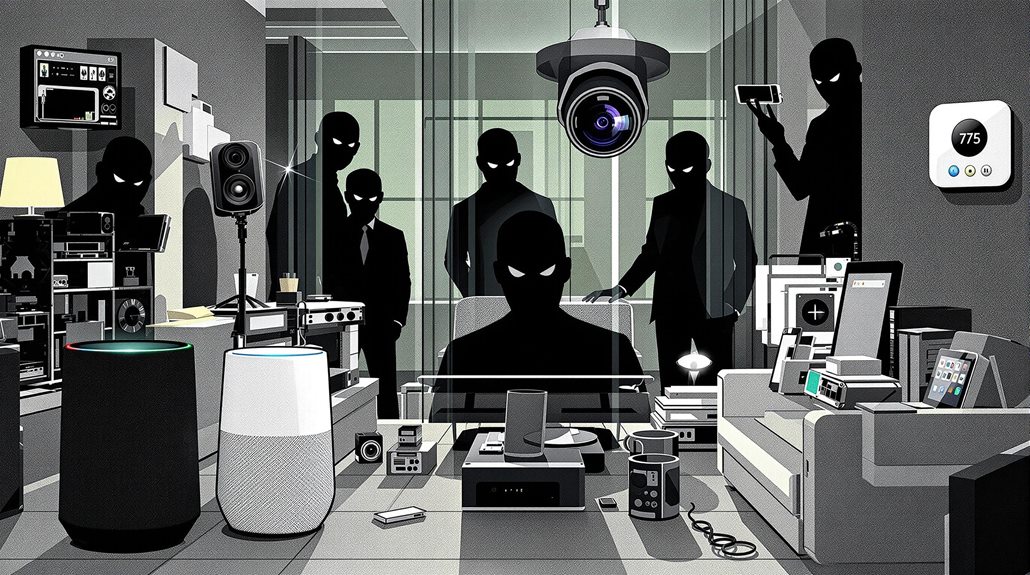In the comfort of your smart home, you’re both the master and the potential victim. You love the convenience that these devices bring, don’t you? However, have you considered the security risks? With each command to Alexa or Google Home, you could be feeding the very system that surreptitiously spies on you.
Intriguingly, the same technology that’s meant to enhance your lifestyle might be serving as an inadvertent spy. Curious to know more about this paradox and how you can safeguard your privacy? Let’s explore further.
Understanding Smart Home Technology
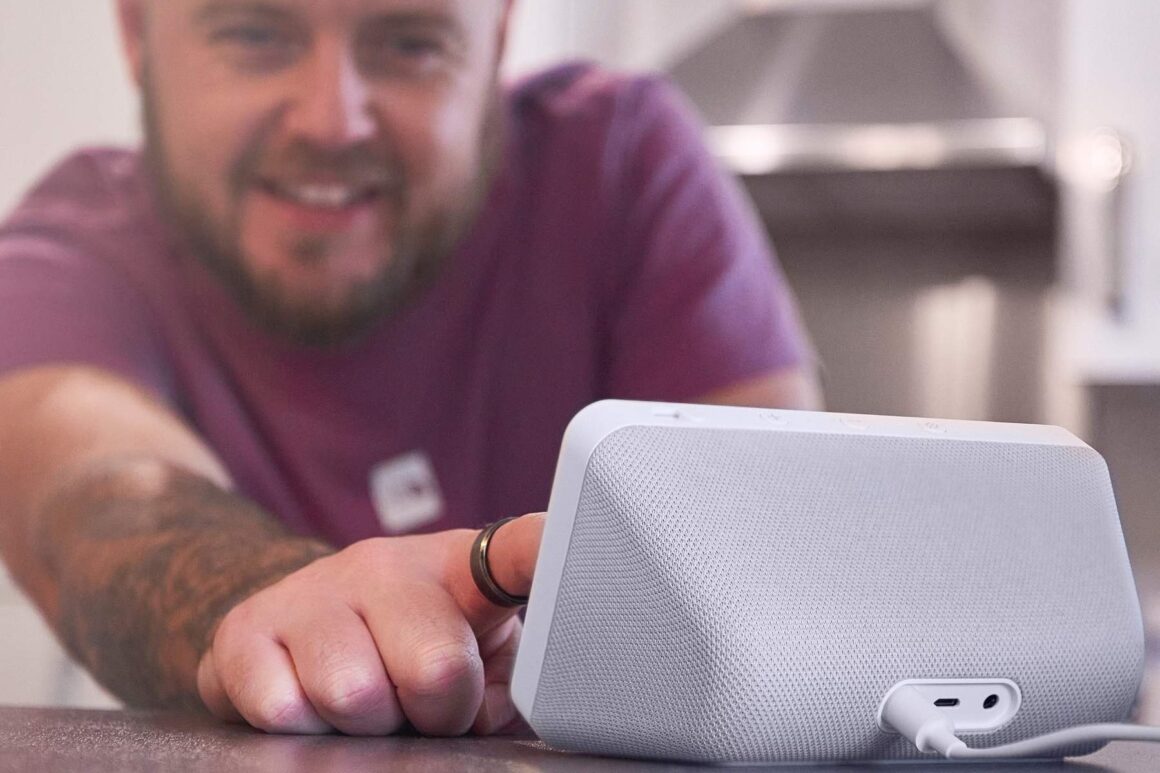
In the domain of technological innovation, smart home technology stands out as a significant development. Envision controlling your lights, heating, and appliances all from your smartphone. The smart home benefits are undeniable: increased convenience, energy efficiency, and even added home value.
But, there’s a catch. Device compatibility issues can be a headache. Not all devices play nice with each other. You might buy a smart light bulb only to find out it doesn’t work with your smart speaker. It’s frustrating, isn’t it?
Then, there’s the big elephant in the room – user privacy concerns. You’re right to worry about who might be listening in or accessing your data. Will your conversations stay private? Are your kids’ routines being monitored? These concerns are real and warrant serious consideration.
Thankfully, companies are implementing data security measures to protect your information. But, it’s also your job to stay informed and make wise choices.
Risks of Smart Home Devices
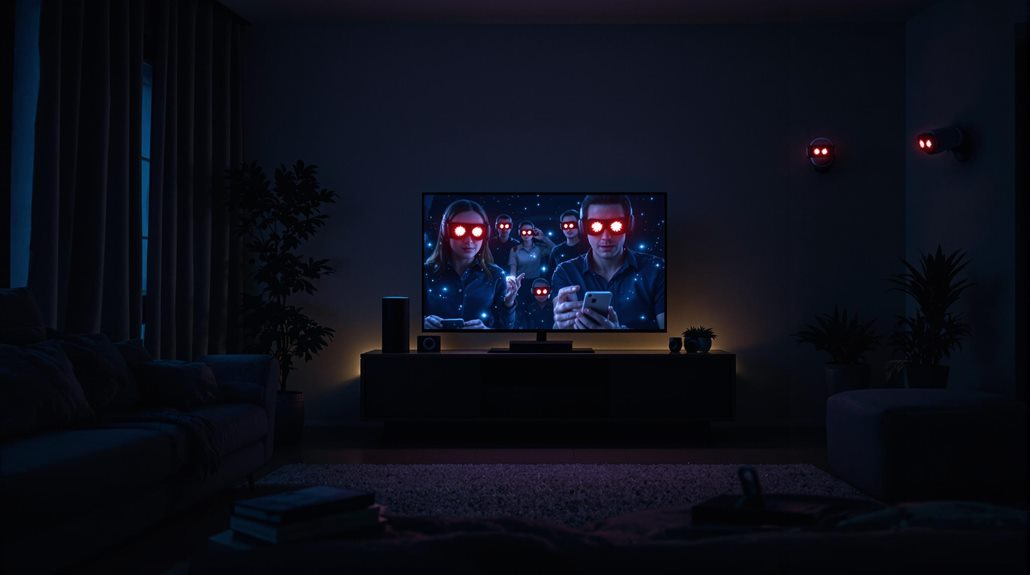
Smart home devices can be a double-edged sword. While they offer convenience and efficiency, they also bring along risks to your data privacy. Picture, in your quest for a smart home, you unknowingly open doors to unauthorized access. It’s a chilling thought, isn’t it?
Device vulnerabilities are a significant concern. Hackers are always on the lookout for loopholes in security protocols. They’re not merely after your personal information, but also the control over your devices. Remember, it’s not solely about privacy; it’s about safety too.
But don’t let fear stop you from enjoying technology. Instead, use it as a driving force to increase your user awareness. Knowledge is power, and in this case, it’s your shield. Understand how your devices work, regularly update your security settings, and ensure to change your passwords often.
Always remember, a smart home is only as smart as its user. You’ve got the power to protect your privacy and security. So, equip yourself with information, tighten those security protocols, and enjoy the convenience that smart home devices offer. After all, they’re here to simplify your life, not complicate it.
Real Life Spying Incidents
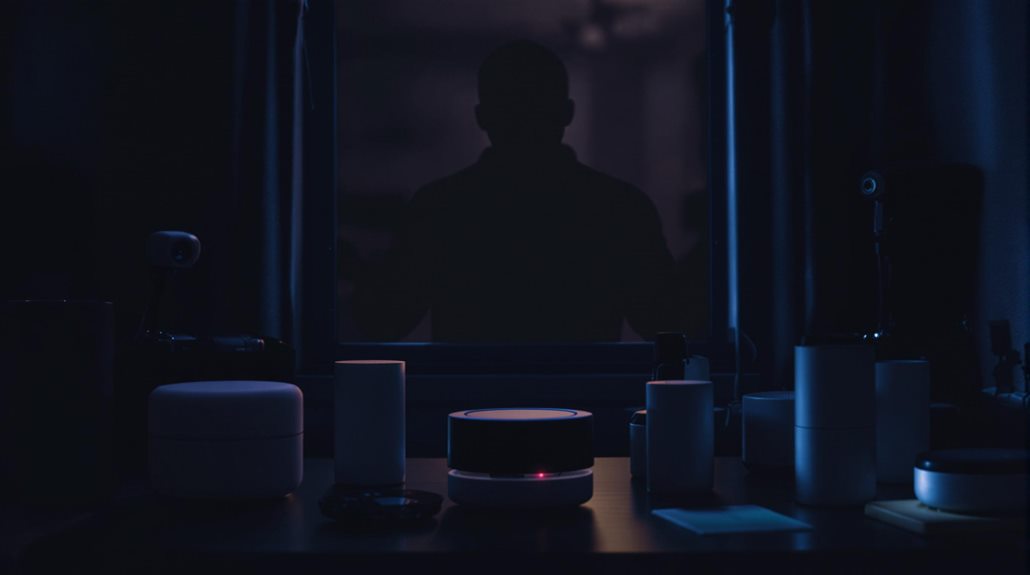
Despite the best of your efforts, there may still be times when your privacy becomes a casualty of technology. Remember those Alexa incidents? Cases have surfaced where Alexa’s recorded conversations were sent to random contacts. You’ve been chatting away, thinking you’re alone, but Alexa’s been taking notes, and she’s not always discreet.
Then there’s the chilling Ring camera breaches. Envision this: you’re cozy in your living room, only to find out later that someone’s been watching through your Ring camera. It’s like a creepy movie plot, but it’s real. And it doesn’t end there. Google Home vulnerabilities, once exploited, can turn your assistant into a live microphone.
Smart TV espionage is another worrying reality. You’ve been binge-watching your favorite show, unaware that your viewing habits could be tracked and analyzed. And let’s not forget the broader IoT surveillance cases. With everything from your fridge to your thermostat connected, a breach could mean someone’s got a front-row seat to your daily life.
How Spying Through Devices Works
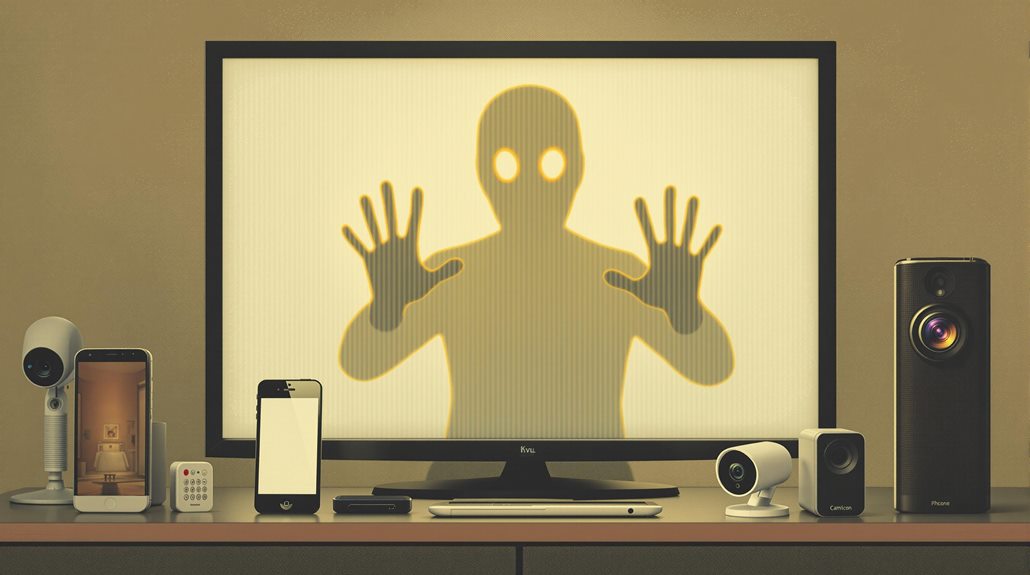
So, you’re probably wondering how this spying through devices happens. Well, let’s break it down. The root of it all is data collection. Your smart home devices are continuously collecting data, tracking your habits, preferences, and routines. They’re listening too – yes, those voice recordings that help Siri, Alexa or Google assist you can be a gold mine for spies.
Now, imagine a privacy breach, where this data is spilled into the wrong hands. That’s when unauthorized access comes into play. Hackers can exploit security vulnerabilities to gain control of your devices. They could watch you through your smart cameras, listen in on your conversations, even control your smart appliances.
The real kicker? Some devices have built-in surveillance capabilities. You buy a security camera to keep an eye on your home, but who’s to say it isn’t watching you too? Fundamentally, your smart home could be transformed into a surveillance hub, with you as the star of the show. It’s a chilling thought, isn’t it? Just remember, as amazing as smart home technology is, it’s important to be aware of the potential risks.
Protecting Your Smart Home
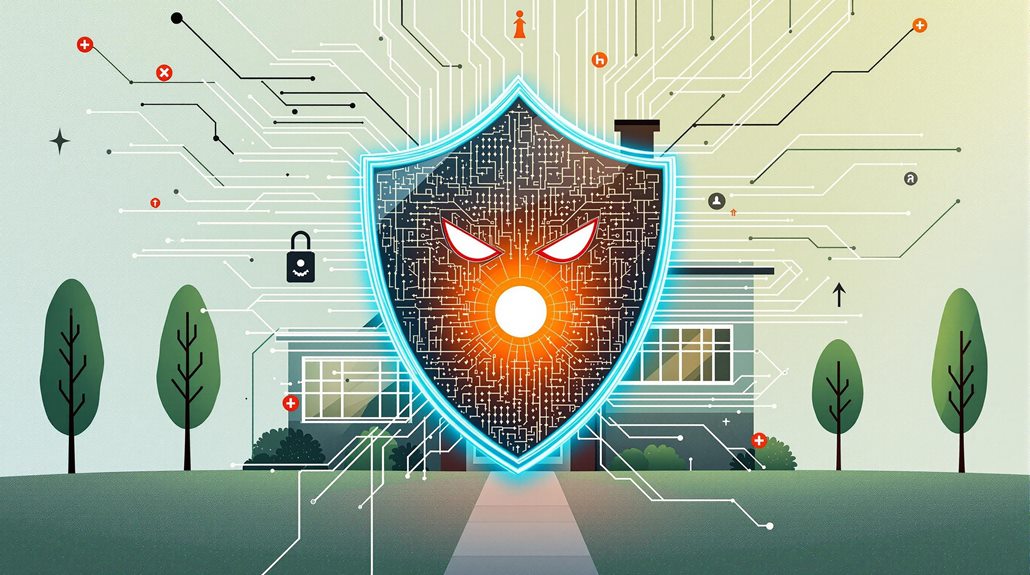
While it’s true that smart home devices can pose a privacy risk, there are ways to safeguard your digital domicile. A keen understanding of data privacy is your first line of defense. Remember, your smart devices collect information about your habits and behaviors, and it’s up to you to control who has access to it.
Next comes device security. Confirm all your devices are password-protected. Don’t just stick with the default passwords; make them unique and complex. User awareness is an underrated weapon. Always know what your devices are capable of, the data they’re collecting, and how they’re using it.
Encryption standards should not be overlooked. They scramble your data into unreadable text, preventing unauthorized access. Ensure your devices and your Wi-Fi network adhere to the latest encryption standards.
Lastly, keep your devices’ firmware updated. Manufacturers often release firmware updates to fix security vulnerabilities. Regular updates can keep potential hackers at bay. It’s your smart home, after all. Take the necessary steps to protect it.
Future Implications and Precautions
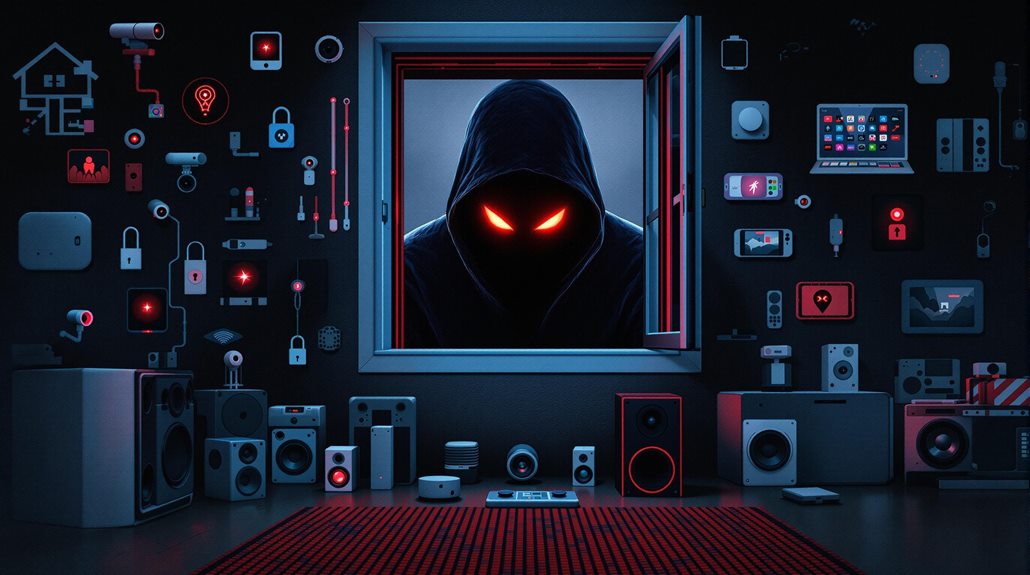
Looking ahead, it’s clear that the domain of smart home devices will continue to evolve. Technological advancements are accelerating at a dizzying pace, promising greater convenience. But what about one’s data privacy? It’s a tricky road to navigate.
Surveillance laws lag behind the rapid tech growth, raising ethical concerns. Individuals are not just battling cyber threats; they’re also wrestling with the question of who has access to personal data and how it’s used. Even as one enjoys the convenience, they’re under a microscope, potentially watched and analyzed.
Increasing consumer awareness is essential. One needs to know what they’re signing up for when installing these smart devices. It’s not enough to just trust the manufacturer’s promises; one needs to do their homework. Understand the device’s privacy policy, the data it collects, and how it’s used.
Moreover, push for stronger surveillance laws to keep pace with technological advancements. Advocate for transparency and accountability from the tech industry. After all, it’s one’s home, privacy, and peace of mind on the line. So, take control, stay educated, and make smart decisions about a smart home.
Wrapping up
So, you’re living in a high-tech wonderland, but beware, your smart toaster might be keeping tabs on your bagel preference. It’s a wild thought, isn’t it? Protecting your smart home isn’t just about securing your gadgets, it’s about guarding your daily routines, your privacy. Keep a sharp eye out, folks! Smart homes can be wonderfully convenient, but remember, they can also morph into watchful eyes. The future is here, and it’s got a bit of a nosy side.

